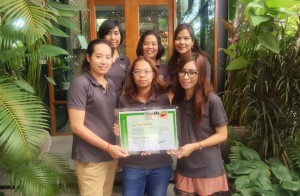
By Willem Niemeijer, Founder & CEO, Khiri Travel Group
Khiri Travel achieved Travelife sustainable tour operator certification in Thailand, Myanmar and Vietnam in June. What lessons did we learn in the process? Why should other tour operators try it? To what extent is it Europe teaching Asia to be sustainable? Or can Asian cultures teach European operators about sustainability?
European tour operators are the most regulated in the world. The EU, individual governments in Europe, travel associations and sectional interest groups are increasingly insisting on outbound tour operator practices being “sustainable” and “responsible”.
Educated European travelers expect to come away feeling that their holiday, particularly to developing countries, genuinely helped the local population economically – and at the very least was neutral in terms of environmental, cultural and social impacts. Ideally, they want to believe their visit was a positive experience for all parties involved.
Towards this end, Travelife certification was founded in 2007 with the Netherlands and UK in the driving seat. It is now partially funded by the CBI, a branch of the Dutch Ministry of Foreign Affairs that helps emerging economies.Travelife’s objective is to make tour operator tourism sustainable. It has already certified tour operators in Europe, Latin America and Africa. Looking further down the supply chain, it is now Asia’s turn.
Asia offers travelers many immersive experiences: being engaged with local communities and enjoying its abundant natural resources. The downside is that this opens the door to detrimental exploitation. If tour operators can begin by deleting the negatives from their programs, it’s a good start.
“There are many issues in Asia which are considered as undesirable in tourism in this region, such as treatment of animals, some activities with children, visiting certain [tribal] communities, endangered animal species on menus and the proliferation of plastic waste,” says Naut Kusters, the Netherlands-based Manager for Travelife for Tour Operators. “Outbound tour operators in Europe would like to have some guarantee that their local inbound partners in Asia comply with up-to-date international ethical standards.”

It’s a laudable goal. That’s why CBI is helping fund inbound tour operator training in Indonesia, Nepal, Bhutan, Myanmar, Sri Lanka and Mongolia, turning theory into practice.
“The strength of Travelife is its flexibility to adjust standards to local realities,” says Marije Maessen, Program Manager at CBI. “So instead of enforcing a fixed blue print on companies in countries which are not comparable in terms of development, conditions, knowledge and possibilities, Travelife is instead driven by the industry itself and takes local input into account. This is more sustainable and creates ownership and true engagement.”
Flexibility and localization are vital if certification is to spread. The CBI is therefore working with PATA and Travelife to implement realistic sustainable standards for very Asian issues such as elephant rides, hilltribe treks, homestays and tourism in proximity to children.
Travelife’s framework of criteria has proved invaluable for a rigorous and critical self-analysis of our operations in Thailand, Myanmar and Vietnam. It has been rewarding to see the teams in each country rally behind the concept of sustainability and eagerly take practical steps to become more sustainable.
As Edwin Briels, the Khiri Travel Myanmar General Manager says: “While everybody usually thinks that Europe is furthest ahead in terms of sustainability, I learned that Myanmar was actually very developed in terms of sustainability – it is just often not specified or labeled as being green or sustainable.”
He says: “When you dig a bit deeper you notice that in many ways the country (Myanmar) and its people are very sustainable. No resources are wasted. People care about each other and donate a lot to charity. And although not all waste is separated into plastic, paper or organic, almost every element is re-used or re-cycled somehow.”
Indeed, doing good (and getting good karma) often comes naturally in Buddhist countries. That’s what sustainability is about – being good for others. Many requirements from Travelife come naturally to Asian people. You just need to articulate it and measure it.
Travelife accreditation gives tour operators ethical credibility. Travelife audits also do not leave room for green-washing. In order to retain accreditation, continuous improvements in sustainability have to be made. This is really to the advantage of our business. Remember, there are three P’s in sustainability: People, Planet and Profit. You can’t have one without the other two.
For fellow tour operators in Asia contemplating Travelife accreditation, I would say, go for it. Learn from the Khiri experience. Engage all your staff in the activities and ask them what they think can be done better to improve sustainability. Implement improvements that come from the heart, from the staff (rather than a list).
The Travelife criteria are a guide in your journey towards sustainability. It’s not about ticking the boxes or requirements. It’s about breathing sustainability through all the processes in your company through all departments and the supply chain.
In Vietnam we found the same. As Florencia Allo Moreno, the Khiri Travel Vietnam Country Manager says, “Do continuous training. Be involved. Motivate and encourage your team. Make sure you have a ‘green team’ that understands what you are doing and their functions. Keep your suppliers informed and make them part of the entire Travelife process.”
And from Thailand: “I recommend that they initiate the process by educating staff so that they fully understand the purpose of Travelife certification and its value,” says Wanphen Kamwaboon, Khiri Travel Thailand Country Manager. “It’s vital to create a core team, comprised of staff from different departments who are responsible for monitoring on-going sustainable practices.”
After Travelife certification you and your teams will see the world in a different way. You’ll find yourself adjusting personal consumption patterns as well.
Most of all it’s rewarding to see proof that sustainability, creativity, running a successful, profitable business and having happy clients and suppliers all go hand in hand.
Sustainable tourism is the art of the possible.
